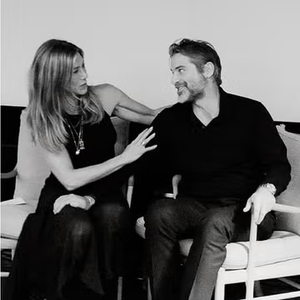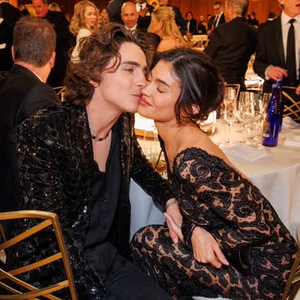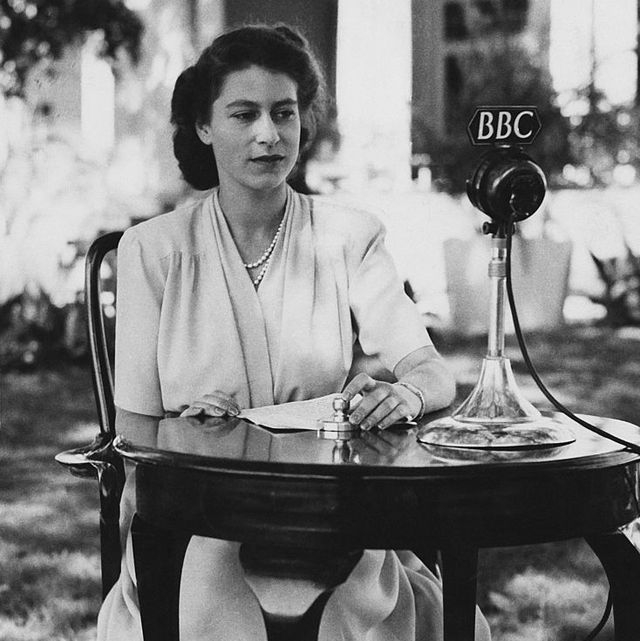
Keluarga kerajaan mengadakan perjamuan tadi malam untuk menyambut presiden Afrika Selatan Cyril Ramaphosa ke Inggris, dan selama pidatonya, Raja Charles III memastikan untuk memberikan penghormatan kepada ibunya, mendiang Ratu Elizabeth II, yang meninggal dua bulan lalu.
Baca juga: Pihak Istana Buckingham Potret Baru Raja Charles III
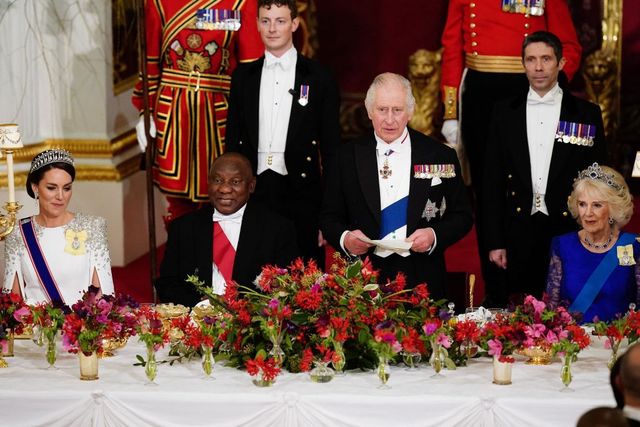
"Afrika Selatan, seperti Persemakmuran, selalu menjadi bagian dari hidup saya. Ibu saya sering mengenang kunjungannya ke Afrika pada tahun 1947, tepat setahun sebelum saya lahir, selepas dari Cape Town, pada hari ulang tahunnya yang ke-21, ia mengikrarkan hidupnya untuk pelayanan rakyat Persemakmuran," ucap Raja.
Pada tanggal 21 April 1947, saat dalam perjalanan ke Afrika Selatan, Ratu Elizabeth — saat itu Putri Elizabeth — bersumpah kepada bangsanya. Ia berkata, "Saya menyatakan di hadapan Anda semua bahwa seluruh hidup saya akan dikhususkan untuk melayani Anda dan melayani keluarga kekaisaran besar kita." Lima tahun kemudian, ayahnya, Raja George VI, meninggal, dan ia menjadi Ratu Inggris. Dirinya telah memerintah selama lebih dari 70 tahun, menjadi Ratu terlama dalam sejarah Inggris.
"Mendiang Ratu dengan senang hati menyambut Presiden Mandela, Mbeki, dan Zuma untuk Kunjungan Kenegaraan ke Inggris, di mana saya hadir. Pada setiap kesempatan itu, ia mengungkapkan kekagumannya pada negara, rakyat, semangat, keindahan alam, dan keragamannya," lanjut Raja Charles, menambahkan bahwa mendiang Ratu selalu berbicara dengan hangat tentang kunjungannya ke Afrika Selatan tahun 1995.
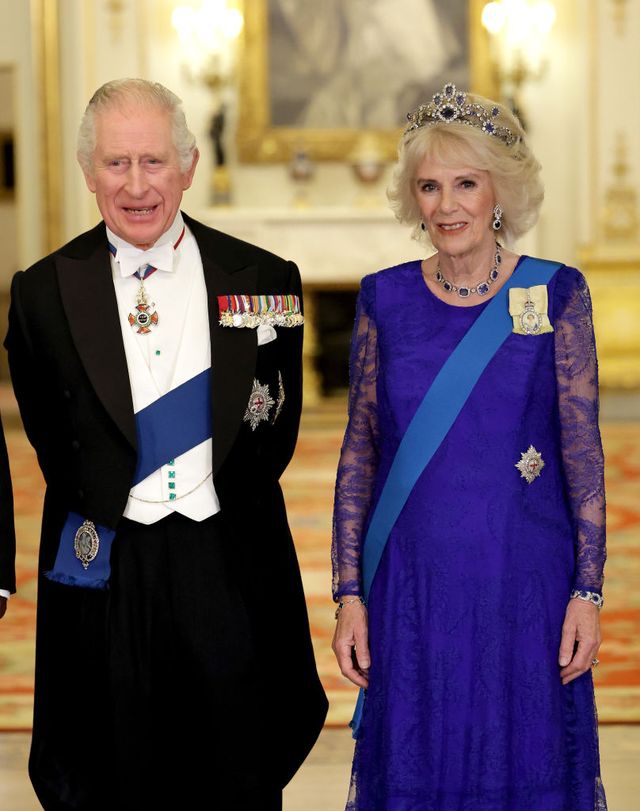
Berikut adalah pidatonya:
President Ramaphosa,
Avuxeni, Dumela, Sawubona, Molo, Molweny, Ndaa. My wife and I are delighted to welcome you to Buckingham Palace this evening.
South Africa, like the Commonwealth, has always been a part of my life. My mother often recalled her visit in 1947, the year before I was born, when, from Cape Town on Her twenty-first birthday, she pledged her life to the service of the people of the Commonwealth.
It is therefore particularly moving and special that you are our guest on this, the first State Visit we have hosted. If I may, I would like to give you our belated but very best wishes for your birthday last week.
The late Queen had the great pleasure of hosting Presidents Mandela, Mbeki and Zuma for State Visits to the United Kingdom, at all of which I was present. On each of those occasions, she expressed her admiration for your country and its people, its vibrancy, natural beauty and diversity.
And she always talked warmly of her return to your country in 1995, as the guest of President Mandela, after the momentous events – driven from within South Africa and supported by so many around the world, including here in the United Kingdom – that brought democracy to your country.
During one of my own visits to South Africa, in 1997, President Mandela told me that he had conferred on my mother a special name – Motlalepula, meaning “to come with rain.” I have been reassured that this was a mark of the particular affection President Mandela felt for the Queen... rather than a remark on the British habit of taking our weather with us!
I know that President Mandela was a friend and mentor to you, Mr. President, and that your own brave and skillful negotiations helped to lay the foundations of modern South Africa.
The determination of people in South Africa to continue the legacy of the great men and women who have built your democracy is truly inspiring. It is our responsibility as leaders, and as partners in the U.N. and G20 as well as the Commonwealth, to create the opportunity, prosperity and security that will allow them to do so. This is what I know you are seeking to achieve, Mr. President, through your Adopt A School Foundation and what the United Kingdom seeks to support through our Chevening Scholarship programme which enables South African students to further their studies in universities across the United Kingdom.
It is only by working together across our countries and our generations that we will tackle some of the greatest challenges of our times. For instance, our collaboration in science and innovation is literally vital in order to protect our people’s health by preparing for future pandemics. Perhaps, above all, we must find and implement practical solutions to the twin, existential threats of climate change and biodiversity loss. To this end, I am proud that the United Kingdom, along with France, Germany, the United States of America and the European Union, have established a lasting partnership with South Africa by supporting your ambitions for a Just Energy Transition to a sustainable, green, economically vibrant future, and that our countries are committed to ensuring an ambitious Global Biodiversity Framework in Montreal this December. These are examples of our crucial modern relationship.
Of course, that relationship goes back centuries. While there are elements of that history which provoke profound sorrow, it is essential that we seek to understand them. As I said to Commonwealth leaders earlier this year, we must acknowledge the wrongs which have shaped our past if we are to unlock the power of our common future.
Today, the links between our countries run deep, with extensive family, professional and cultural ties. This month in London, for example, one could visit the Royal Academy where the major exhibition is a tribute to a South African artist, William Kentridge; or one might go, as my wife and I did, to visit the Victoria and Albert Museum, to see the Africa Fashion Exhibition which celebrates the daring, innovative style of South African designers; or, this weekend, one might choose to travel to Twickenham where English supporters will hope not to have to relive those extraordinary eighty minutes in 2019 when Siya Kolisi led and inspired your country to victory!
Indeed sport, which has done so much to define South Africa’s modern history, is inescapable in our relationship, and it is forging new paths. In women’s football, this year, Banyana Banyana brought home the Women’s Africa Cup, while our own Lionesses won the European Championship.
Mr. President, your Visit offers an opportunity for us to chart a path forward together, investing in each other’s potential, and facing the challenges of our world together, as partners, and as friends, striving for equality, justice and fairness for all. At the turn of the year the world paid tribute to the life and legacy of a great South African, former Archbishop Desmond Tutu. Amongst his many memorable teachings, I am often reminded of one saying in particular – “My humanity is bound up in yours, for we can only be human together.” I believe that is a vital lesson for us all, and an important thread in the partnership between our countries.
Ladies and gentlemen, as we commit to continuing on that journey, I invite you all to rise and drink a toast to President Ramaphosa, and to the people of South Africa.
Nkosi Sikelel’ iAfrika.
Baca juga:
Rahasia Di Balik Bunga yang Ditaruh di Atas Peti Mati Ratu Elizabeth II
Raja Charles III dan Permaisuri Camilla Mengadakan Audiensi Pertama Mereka di Istana Buckingham
(Penulis: Rosa Sanchez; Artikel ini disadur dari Bazaar US; Alih bahasa: Diah Pithaloka; Foto: Courtesy of BAZAAR US)





